
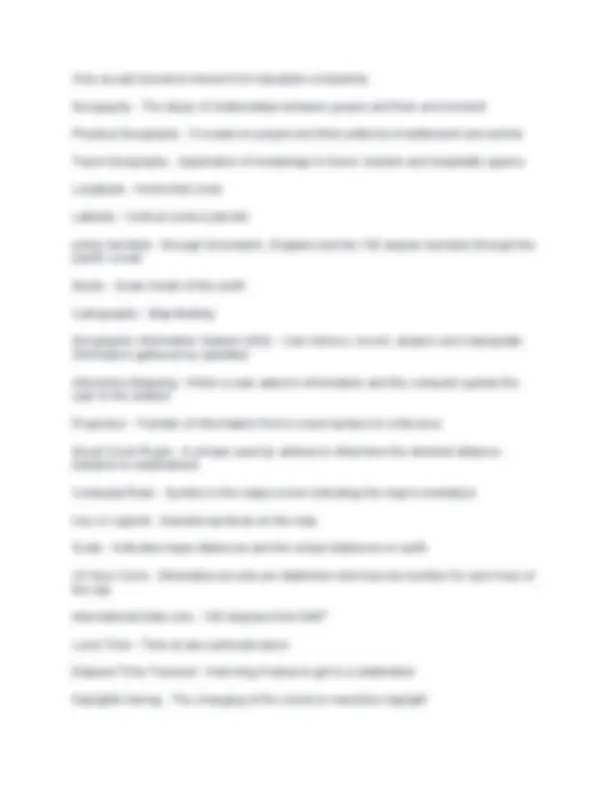
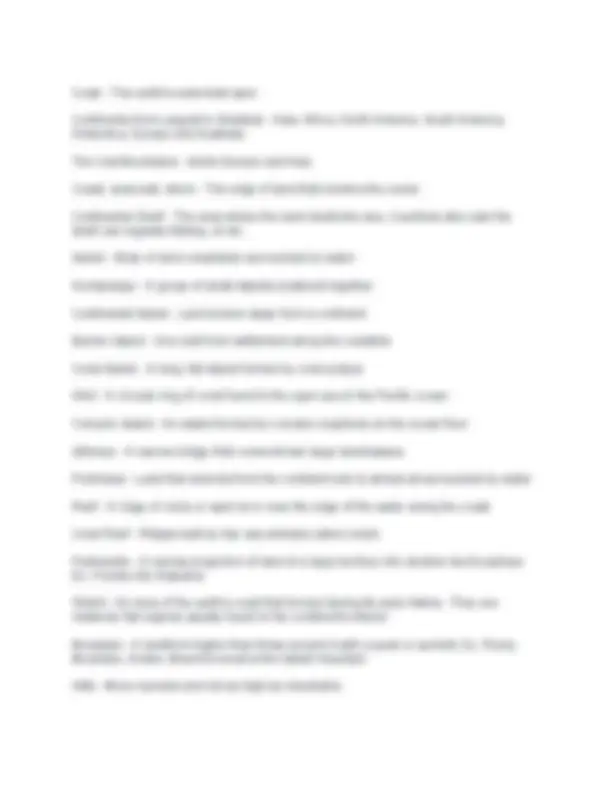
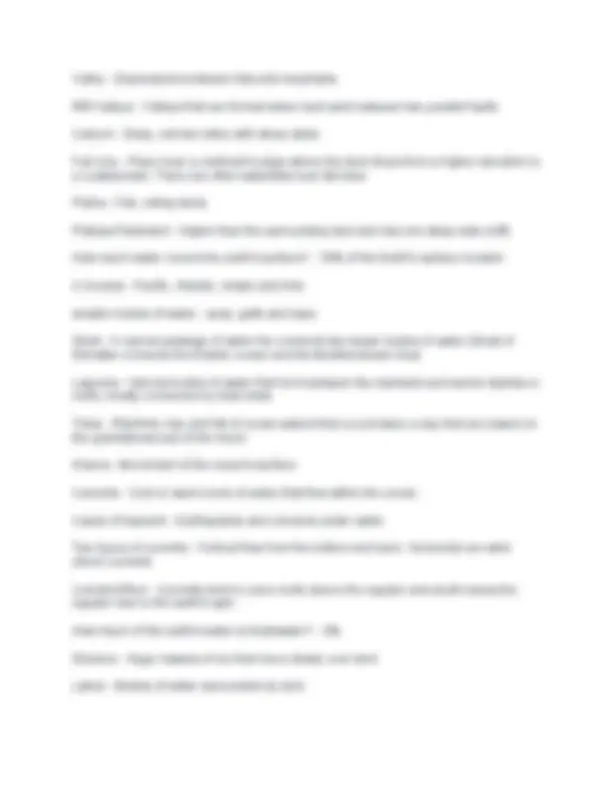
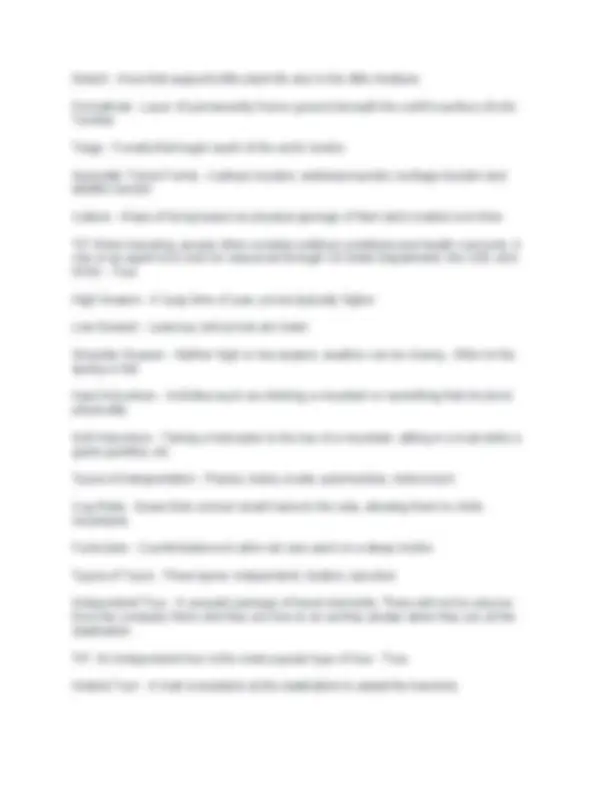
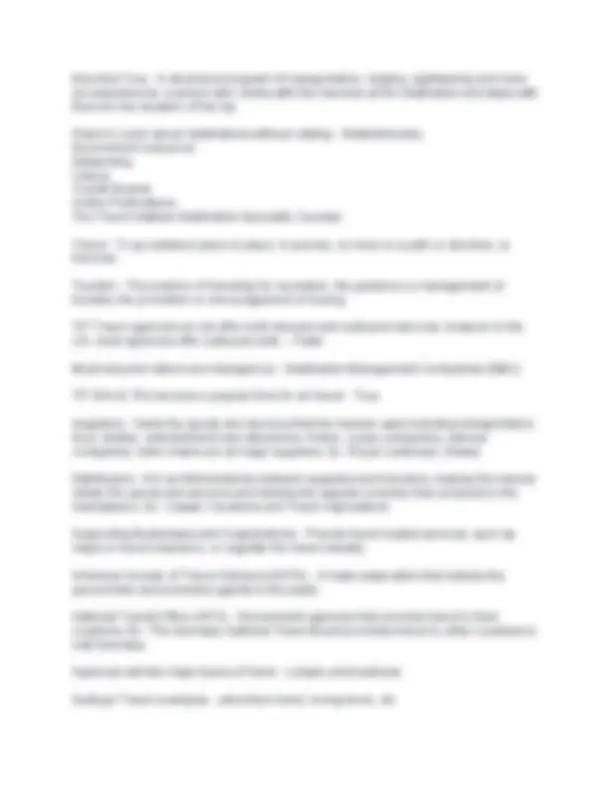
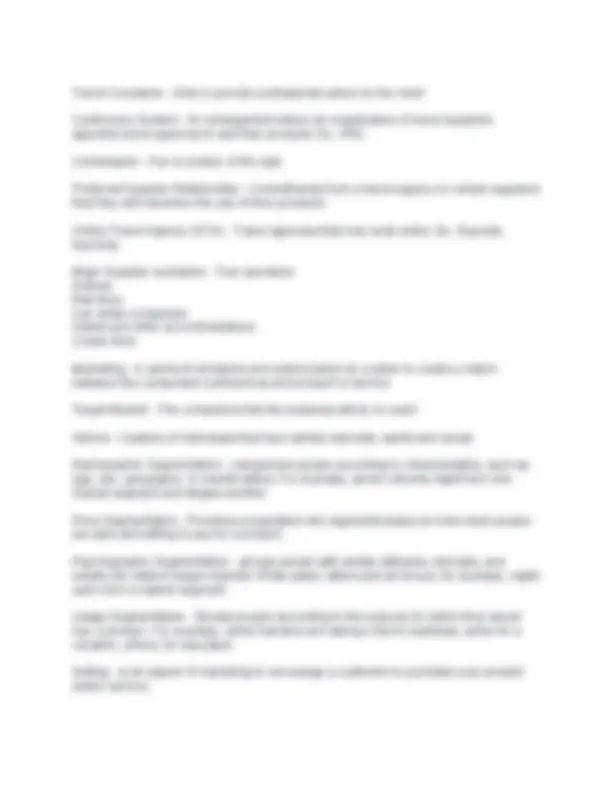
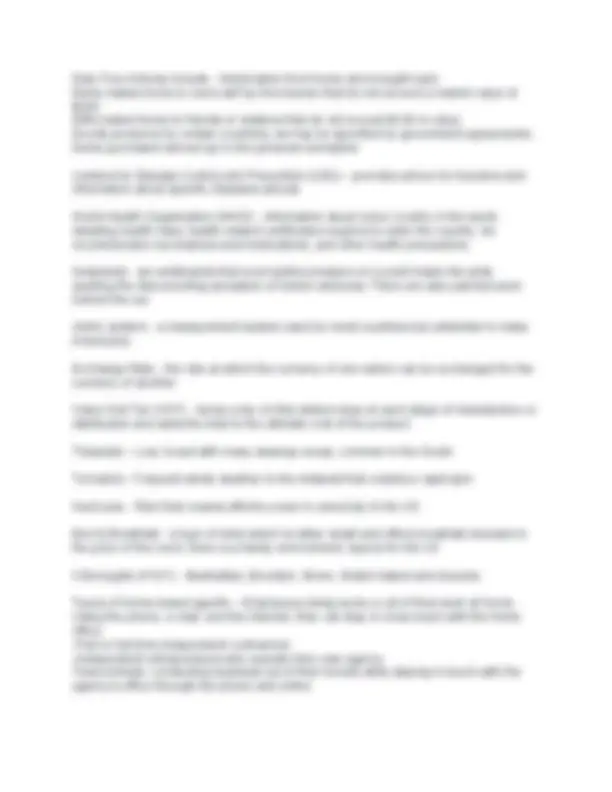
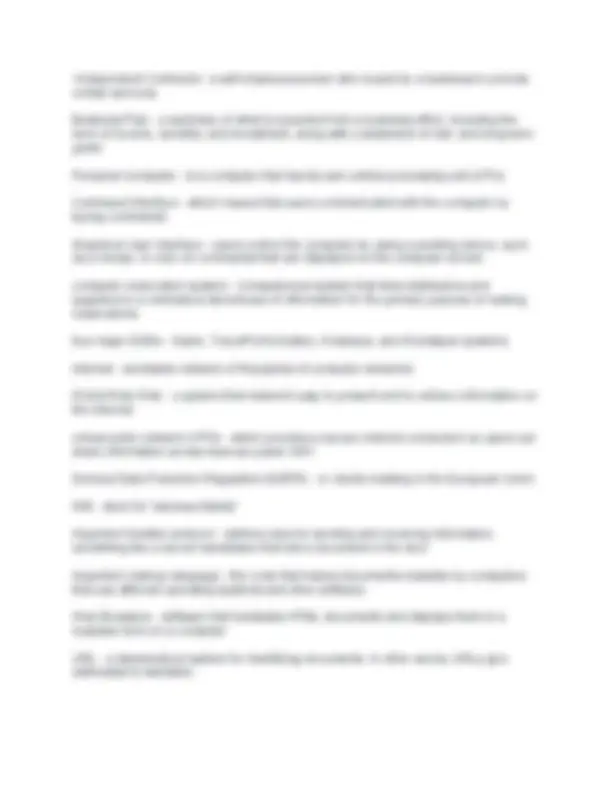
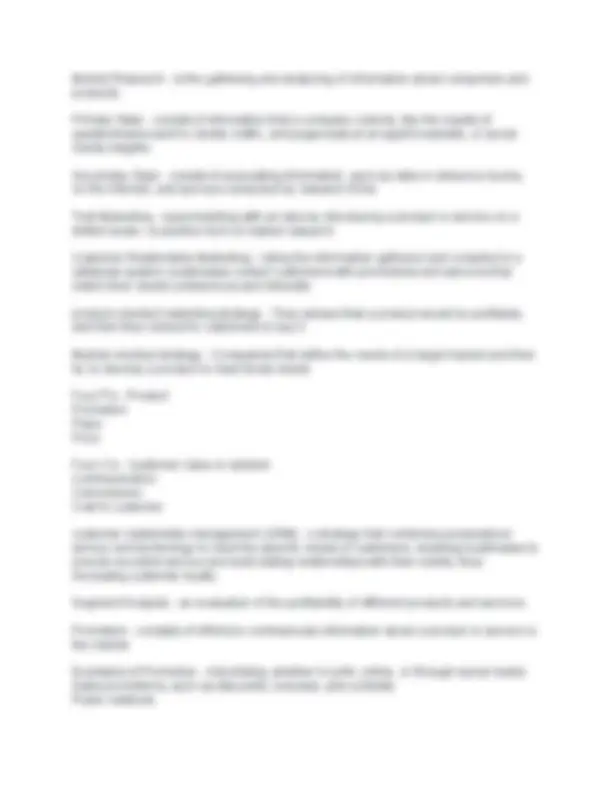
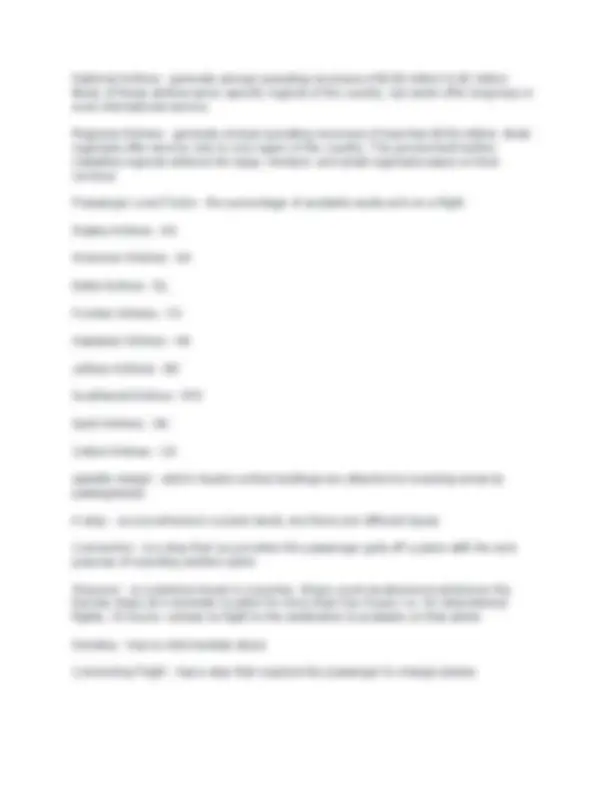
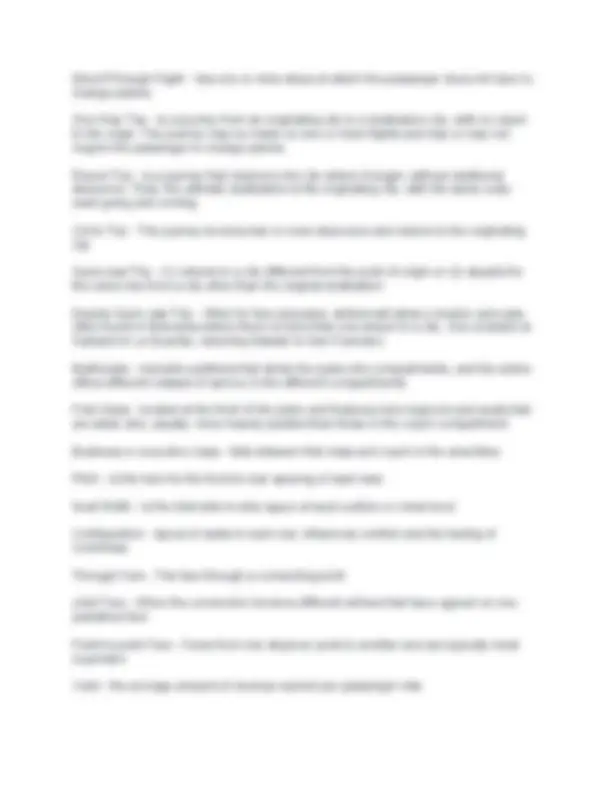
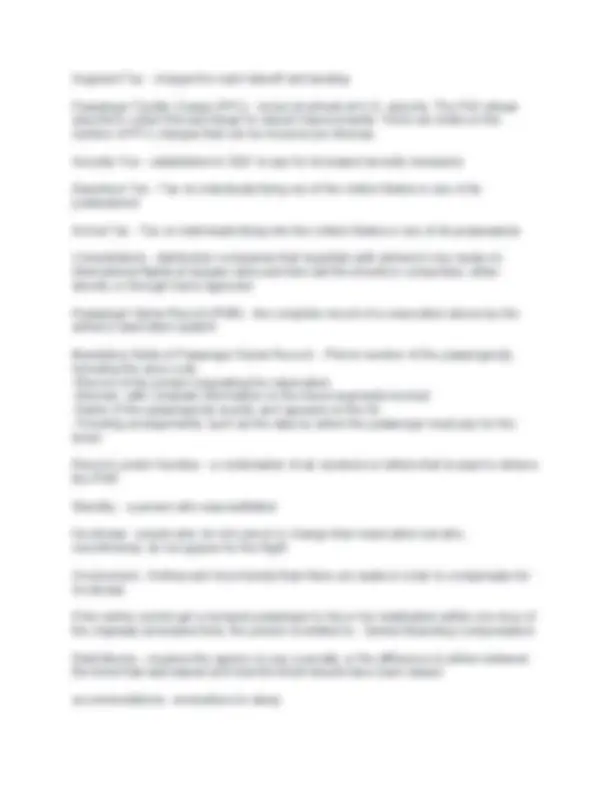
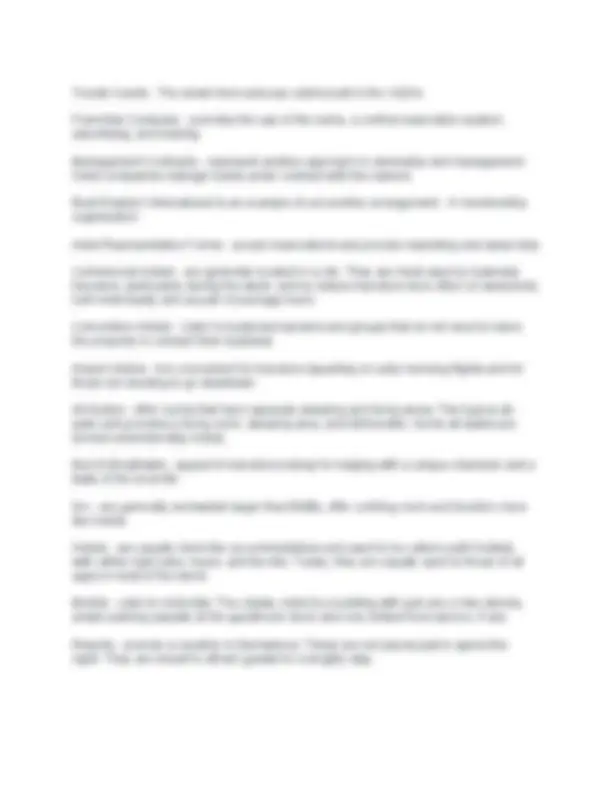
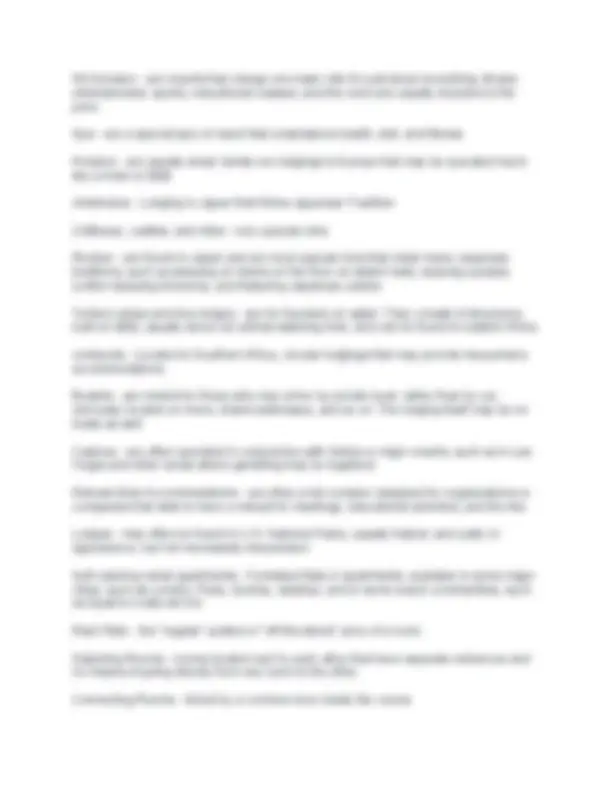
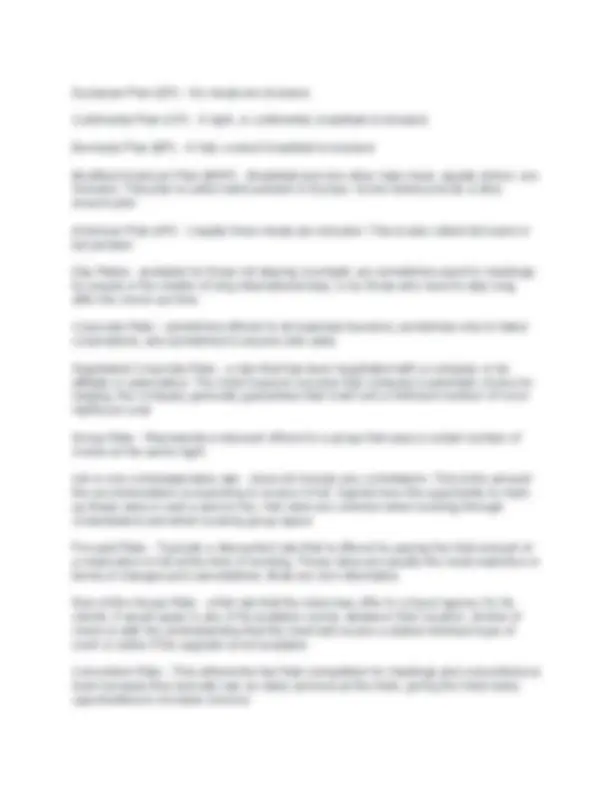
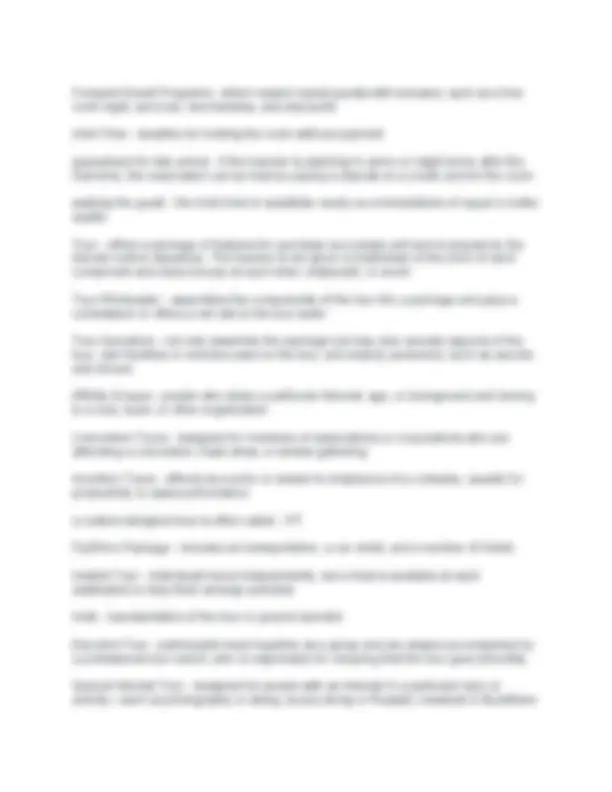
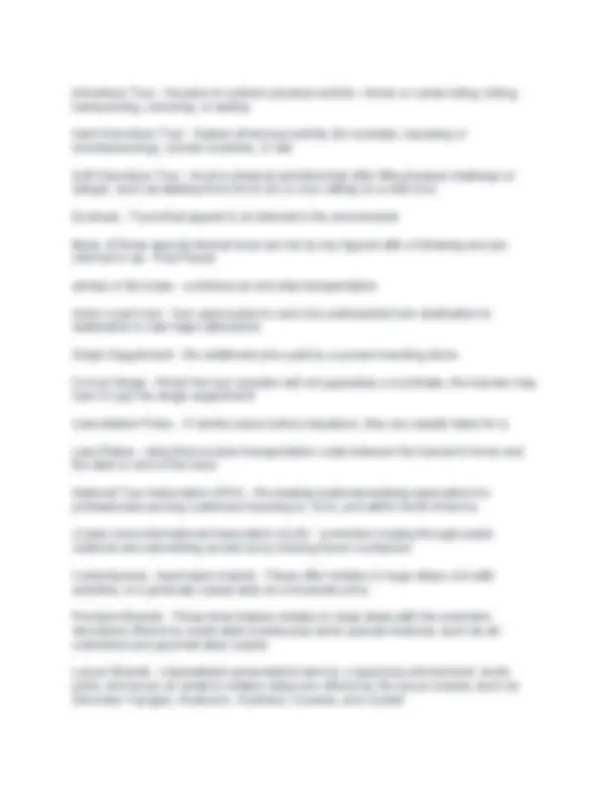
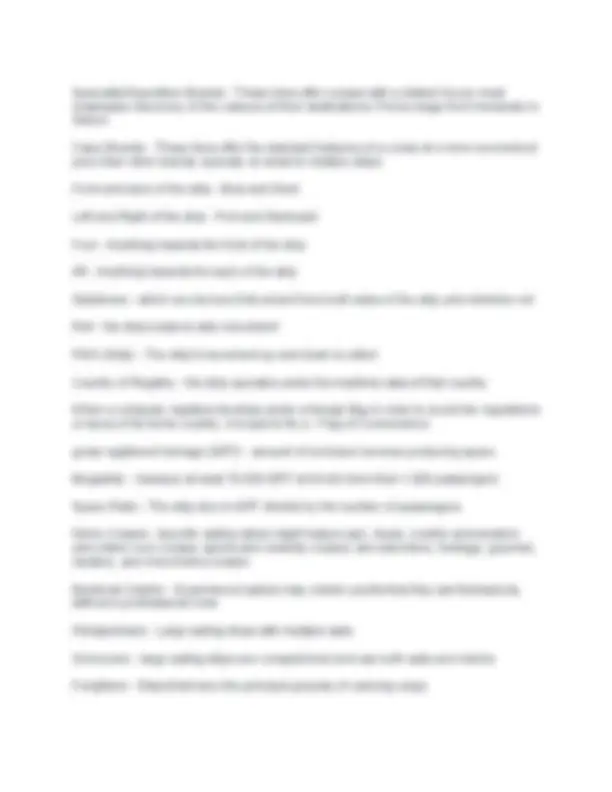
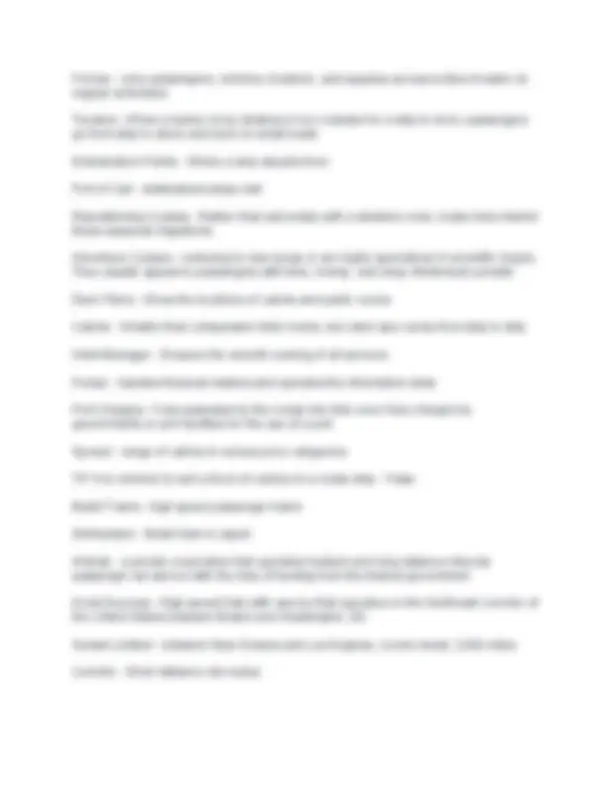
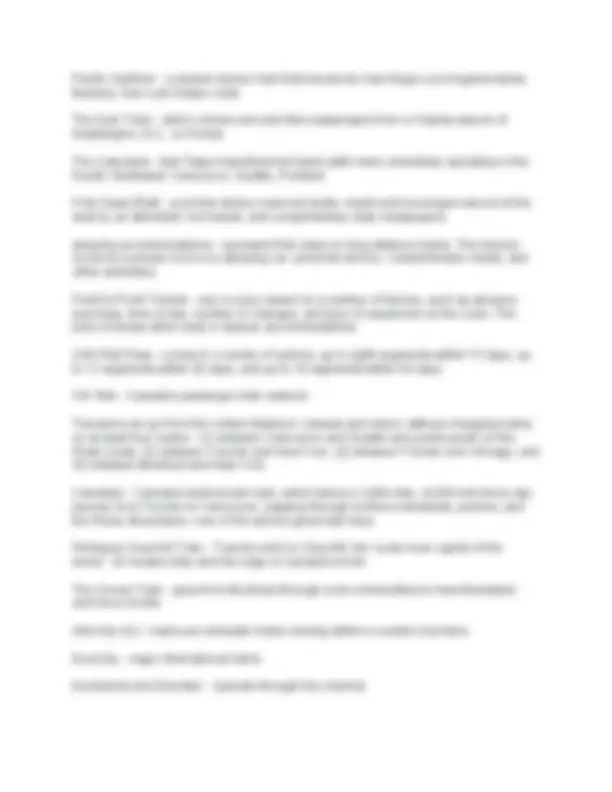
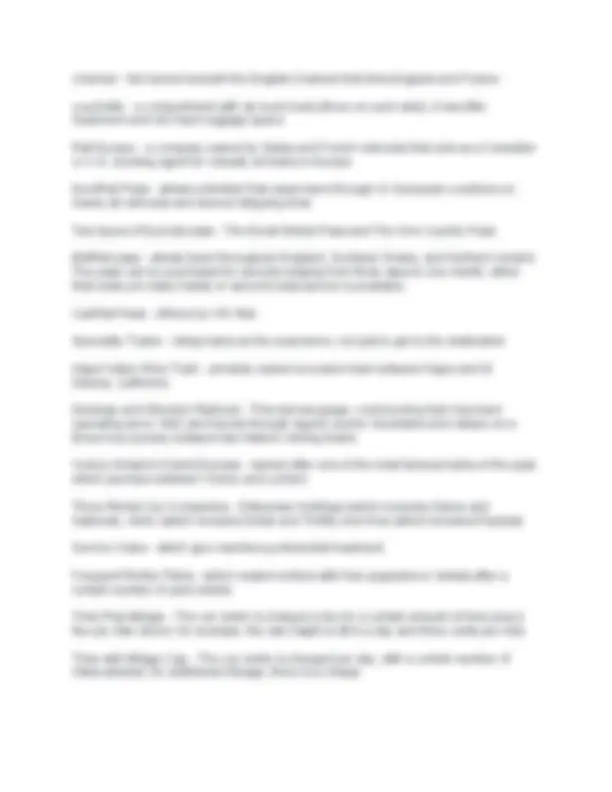
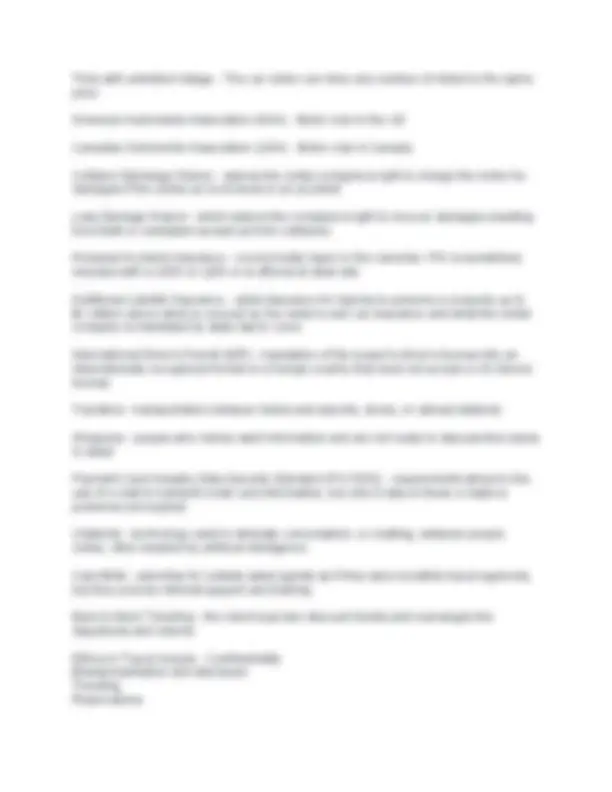
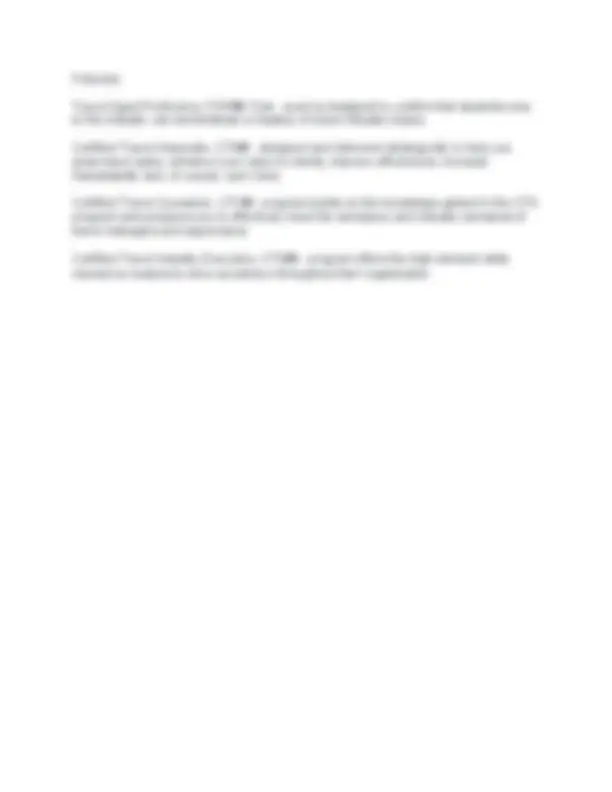


Study with the several resources on Docsity

Earn points by helping other students or get them with a premium plan


Prepare for your exams
Study with the several resources on Docsity

Earn points to download
Earn points by helping other students or get them with a premium plan
Community
Ask the community for help and clear up your study doubts
Discover the best universities in your country according to Docsity users
Free resources
Download our free guides on studying techniques, anxiety management strategies, and thesis advice from Docsity tutors
Travel Agent Proficiency Test Final Review Verified A+ Travel Agent Proficiency Test Final Review Verified A+
Typology: Exams
1 / 31

This page cannot be seen from the preview
Don't miss anything!
























Fixed Expenses - costs that remain unchanged during a specific period despite changes in the volume of business. Variable Expenses - are costs that increase and decrease directly and proportionately with changes in business volume. Semi-Variable or Mixed Expenses - are costs that change in response to a change in business volume, but they change by less than a proportional amount. Income Statement - summarizes revenues earned and expenses incurred for a particular period Balance Sheet - it shows the financial position of a business at a particular time and may compare it to the business's position at the same time of a previous year. This includes assets, liability and equity Suppliers receive payment in four ways - Directly from client CC company In the form of checks from agencies Through ARC (Airline Reporting Corporation) Agents Receive Payments in 3 Ways - Through ARC By deducting commission prior to sending to supplier By check from supplier ARC (AIRLINE REPORTING CORP) - an organization owned by major airlines that regulates the sale of airline tickets by appointing those who may sell them. Accountable Documents - issues standardized numbered forms that serve as tickets, and it operates a centralized system for processing sales. Area Bank Settlement Plan - the system set up by ARC through which participating suppliers receive payments for sales by travel agencies ARC Report - Each travel agency pays the ARC suppliers weekly by electronically filing a mandatory report of sales base fare - the fare shorn of all taxes Escrow Account - An account held by a third party or a bank that holds on to funds until all requirements are fulfilled for them to be released
overrides - bonus commissions to agencies that meet various sales goals or move clients to the supplier's products Income for Travel Agencies - Commission on sales of transportation, accommodation, cruises, tours and other services Override commissions Fees and service charges Markups on net charges Cost Benefit Analysis - A tool entrepreneurs use to hold down expenses and ensure profits (ex. Buying flowers or gifts for a client) Consortium - which is an association of agencies that retain their independent identities but pool their resources for certain purposes Miscellaneous Charges Order (MCO) - It records deposits and full prepayments for transportation, tour packages, supplemental charges, accommodations, or additional collections. A clear description of the type of service for which it is issued must be indicated on the MCO. Voucher - Any document used to confirm arrangements, identify clients, or indicate payments made Invoice - Indicates the amount due from a client and constitutes an implied contract between the agency and the client for services rendered in exchange for payment Receipt - Invoices that indicate an amount paid and the method of payment. ARC's Industry Handbook - lists the forms of payment accepted by specific airlines, and CRSs indicate if a particular credit card payment is not acceptable to the airline being used. Travel Agency Service Fee (TASF) program - allows agencies to accept credit card purchases for non-ARC items, such as service charges, and to process them through the Area Bank Settlement Plan for a 3.5 percent fee Protocol with checks and travelers checks - Do not accept checks from anyone unless they are trustworthy, or if you can hold on to the tickets until the check clears Do not accept checks from someone else who is not the person booking Do not accept checks that are over the amount that they are charged Some agencies use a check verification service to ensure that the funds will clear, although it is not necessary Write clients name, proof of identity, address, phone number, Drivers License on the back of the check Never accept pre signed travelers checks
Crust - The earth's outermost layer Continents from Largest to Smallest - Asia, Africa, North America, South America, Antarctica, Europe and Australia The Ural Mountains - divide Europe and Asia Coast, seacoast, shore - The edge of land that borders the ocean Continental Shelf - The area where the land meets the sea. Countries who own the shelf can regulate fishing, oil etc Island - Body of land completely surrounded by water Archipelago - A group of small islands clustered together Continental Island - Land broken away from a continent Barrier Island - One built from settlement along the coastline Coral Island - A long, flat island formed by coral polyps Atoll - A circular ring of coral found in the open sea in the Pacific ocean Volcanic Island - An island formed by volcanic eruptions on the ocean floor Isthmus - A narrow bridge that connects two large landmasses Peninsula - Land that extends from the continent and is almost all surrounded by water Reef - A ridge of rocks or sand at or near the edge of the water along the coast Coral Reef - Ridges built by tiny sea animals called corals Panhandle - A narrow projection of land of a large territory into another land's surface. Ex- Florida into Alabama Shield - An area of the earth's crust that formed during its early history. They are relatively flat regions usually found in the continent's interior Mountain - A landform higher than those around it with a peak or summit. Ex. Rocky Mountain, Andes. Mount Everest is the tallest mountain. Hills - More rounded and not as high as mountains
Valley - Depressions between hills and mountains Rift Valleys - Valleys that are formed when land sank between two parallel faults Canyon - Deep, narrow valley with steep sides Fall Line - Place near a continent's edge where the land drops from a higher elevation to a coastal plain. There are often waterfalls near fall lines Plains - Flat, rolling lands Plateau/Tableland - Higher than the surrounding land and has one steep side (cliff) How much water covers the earth's surface? - 70% of the Earth's surface is water 4 Oceans - Pacific, Atlantic, Indian and Artic smaller bodies of water - seas, gulfs and bays Strait - A narrow passage of water the connects two larger bodies of water (Strait of Gibraltar connects the Atlantic ocean and the Mediterranean Sea) Lagoons - Narrow bodies of water that form between the mainland and barrier islands or reefs, mostly connected by tidal inlets Tides - Rhythmic rise and fall of ocean waters that occurs twice a day that are based on the gravitational pull of the moon Waves - Movement of the ocean's surface Currents - Cold or warm rivers of water that flow within the ocean Cause of tsunami - Earthquakes and volcanos under water Two types of currents - Vertical flow from the bottom and back. Horizontal are wind driven currents Coriolis Effect - Currents tend to curve north above the equator and south below the equator due to the earth's spin. How much of the earth's water is freshwater? - 3% Glaciers - Huge masses of ice that move slowly over land Lakes - Bodies of water surrounded by land
Icecap - Always cold, precipitation almost always snow Mediterranean climate - have warm, dry summers and mild, wet winters Temperature - The degrees of hotness or coldness measured by a thermometer (Celcius, fahrenheit, centigrade). 64 is too cold for sitting around, 86 too hot for activity Atmospheric Pressure - The weight of the atmosphere as measured by a barometer. Changes in pressure signal weather change. Wind - Air movement caused by an uneven heating of the earth by the sun Humidity - How much water vapor the air contains Precipitation - Rain, hail, snow, sleet when water and winds interact with the temperature Clouds - Consist of tiny water droplets or ice crystals Tropic of Cancer and Tropic of Capricorn - The highest and lowest points that the sun can reached directly overhead Trade Winds - Winds from the northeast blowing towards the equator in the northern hemisphere, southeast towards the equator in the southern hemisphere Westerlies - Currents of high air above the earth coming from the northeast towards the equator in the northeast hemisphere and southwest towards the equator in the southern hemisphere Altitude - Height in the atmosphere Elevation - Height relative to earth Windward - In the path of the wind. Rainiest places are often windward Leeward - Not in the path of the wind, said to be in a rain shadow Gulf Stream - How a current affects a climate Forest - Evergreen and trees that grow on every continent except for Antarctica How much of the earth does rainforests cover - 5% Grasslands - Flat, rolling open areas where the grasses are the natural vegetation (Middle America, Savannah)
Desert - Area that supports little plant life due to the little moisture Permafrost - Layer of permanently frozen ground beneath the earth's surface (Arctic Tundra) Taiga - Forests that begin south of the arctic tundra Speciality Travel Forms - Culinary tourism, wellness tourism, heritage tourism and wildlife tourism Culture - Ways of living based on physical geology of their land created over time T/F When traveling, people often consider political conditions and health concerns. A role of an agent is to look for resources through US State Department, the CDC and WHO - True High Season - A busy time of year, prices typically higher Low Season - Less buy and prices are lower Shoulder Season - Neither high or low season, weather can be chancy. Often in the spring or fall Hard Adventure - Activities such as climbing a mountain or something that involved physicality Soft Adventure - Taking a helicopter to the top of a mountain, sitting in a boat while a guide paddles, etc. Types of transportation - Planes, trains, boats, automobiles, motorcoach Cog Rails - Gears that connect small trains to the rails, allowing them to climb mountains Funiculars - Counterbalanced cable rail cars used on a steep incline Types of Tours - Three types- independent, hosted, escorted Independent Tour - A prepaid package of travel elements. There will not be anyone from the company there and they are free to do as they please when they are at the destination T/F: An independent tour is the most popular type of tour - True Hosted Tour - A host is available at the destination to assist the travelers.
Travel Counselor - Able to provide professional advice to the client Conference System - An arrangement where an organization of travel suppliers appoints travel agencies to sell their products. Ex- ARC Commission - Fee or portion of the sale Preferred Supplier Relationship - Commitments from a travel agency to certain suppliers that they will maximize the use of their products Online Travel Agency (OTA) - Travel agencies that only exist online. Ex- Expedia, travlocity Major Supplier examples - Tour operators Airlines Rail lines Car rental companies Hotels and other accommodations Cruise lines Marketing - A series of decisions and actions taken by a seller to create a match between the consumers' preferences and product or service Target Market - The consumers that the business will try to reach Niches - Clusters of individuals that have similar interests, wants and needs Demographic Segmentation - categorizes people according to characteristics, such as age, sex, geography, or marital status. For example, senior citizens might form one market segment and singles another. Price Segmentation - Provides a population into segments based on how much people are able and willing to pay for a product. Psychographic Segmentation - groups people with similar attitudes, interests, and beliefs into distinct target markets. White-water rafters and art lovers, for example, might each form a market segment. Usage Segmentation - Divides people according to the purpose for which they would buy a product. For example, some travelers are taking a trip for business; some for a vacation, others, for education Selling - is an aspect of marketing to encourage a customer to purchase your product and/or service.
Making a Sale 3 steps - 1. Identify the customers needs
Duty Free Articles Include - Items taken from home and brought back. Items mailed home to one's self by the traveler that do not exceed a market value of $200. Gifts mailed home to friends or relatives that do not exceed $100 in value. Goods produced by certain countries, as may be specified by government agreements. Items purchased abroad up to the personal exemption Centers for Disease Control and Prevention (CDC) - provides advice for travelers and information about specific diseases abroad World Health Organization (WHO) - information about every country in the world, detailing health risks, health-related certificates required to enter the country, its recommended vaccinations and medications, and other health precautions. Seabands - are wristbands that exert subtle pressure on a point inside the wrist, quelling the disconcerting sensation of motion sickness. There are also patches worn behind the ear metric system - a measurement system used by most countries but unfamiliar to many Americans Exchange Rate - the rate at which the currency of one nation can be exchanged for the currency of another Value Add Tax (VAT) - levies a tax on this added value at each stage of manufacture or distribution and adds the total to the ultimate cost of the product Tidewater - Low, broad with many swampy areas, common in the South Tornados - Frequent windy weather in the midwest that creates a rapid spin Hurricane - Rain that creates affects ocean in June/July in the US Bed & Breakfast - a type of hotel which is rather small and offers breakfast included in the price of the room, there is a family environment, typical for the UK 5 Boroughs of NYC - Manhattan, Brooklyn, Bronx, Staten Island and Queens Types of Home based agents - -Employees doing some or all of their work at home. Using the phone, e-mail, and the Internet, they can stay in close touch with the home office. -Part or full-time independent contractors -Independent entrepreneurs who operate their own agency Telecommute: conducting business out of their homes while staying in touch with the agency's office through the phone and online.
-Independent Contractor: a self-employed person who is paid by a business to provide certain services. Business Plan - a summary of what is expected from a business effort, including the level of income, benefits, and investment, along with a statement of mid- and long-term goals Personal Computer - is a computer that has its own central processing unit (CPU) Command Interface - which means that users communicated with the computer by typing commands Graphical User Interface - users control the computer by using a pointing device, such as a mouse, to click on commands that are displayed on the computer screen computer reservation system - Computerized system that links distributors and suppliers to a centralized storehouse of information for the primary purpose of making reservations four major GDSs - Sabre, TravelPort's Galileo, Amadeus, and Worldspan systems Internet - worldwide network of thousands of computer networks World Wide Web - a system that makes it easy to present and to retrieve information on the Internet virtual public network (VPN) - which provides a secure Internet connection so users can share information across insecure public WiFi General Data Protection Regulation (GDPR) - or clients residing in the European Union Wifi - short for "wireless fidelity" Hypertext transfer protocol - defines rules for sending and receiving information, something like a secret handshake that lets a document in the door Hypertext markup language - the code that makes documents readable by computers that use different operating systems and other software Web Browsers - software that translates HTML documents and displays them in a readable form on a computer URL - a standardized system for identifying documents. In other words, URLs give addresses to websites.
Person-to-person selling Cooperative Advertising - it is an arrangement in which travel suppliers or distributors (particularly cruise lines and tour operators) share the cost of print advertising with travel agencies Independent Contractor - people who are not employees but are self-employed, working under contract Business Development Manager - Outside sales agents for suppliers qualifying questions - When would you like to go? Do you know exactly where you would like to go? Do you know exactly where you would like to go? How long do you plan to be away? What kind or class of service do you need? You might answer this question by saying, "What kinds of hotels do you usually like to stay in? Should we look for the same type this time?" or "Is this a special occasion?" Cross-selling - selling additional products or services—is another way of increasing a sale while providing more service Buying signals - signs that the customer is ready to make the purchase Parador - a small country inn Travelers with Disabilities - those who have impaired mobility and require special arrangements—such as people who are blind or deaf, confined to wheelchairs or stretchers, mentally challenged, very elderly, extremely obese, or in need of oxygen or a respirator Meeting planners - act as intermediaries, conveying to suppliers the wishes and requirements of the sponsor of the meeting Ethnic Agencies - travel agencies or tour companies that specialize in travel for persons of a particular ethnic background or language Flight Insurance - Accidents that occur in connection with air travel are covered Travel accident and health insurance - protects the insured in case of accidents (whether travel-related or not) and sickness at all times while away from home baggage and personal possessions insurance - protection in case their baggage or personal possessions are lost, stolen, or damaged while traveling
Trip Cancellation or interruption insurance - It reimburses clients for (1) nonrefundable prepayments if they must cancel a trip for a reason covered by the policy and (2) any nonrefundable portion of their trip and the cost of transportation home should they have to discontinue a trip Domestic Air Travel - which includes flights between and within the continental United States and parts of Alaska, Hawaii, Puerto Rico, the Virgin Islands, and Canada Air Traffic Conference (ATC) - stablish a standard sales contract, appoint travel agencies to sell air travel and set up ways to transfer baggage and handle reservations Federal Aviation Administration, or FAA - to license pilots, certify aircraft as safe and enforce rules regarding passenger safety National Transportation Safety Board (NTSB) - created to investigate accidents, and the FAA became part of the Department of Transportation (DOT) Airline Deregulation Act - ended the government's economic control of U.S. airlines. Airlines were given the power to determine their own routes, fares, and commissions Canadian Aviation Regulations (CARs) - which are a compilation of regulatory requirements and rules governing civil aviation in Canada Interline Agreement - Many aspects of air travel are governed by agreements among the airlines themselves Air Transport Association (ATA) - The trade association of major North American airlines, to adopt a system remarkably similar to the one that existed during the era of government regulation Standard Ticket - which let passengers fly on many airlines with just one ticket open-skies policy - under which carriers can fly where they choose, charge what they wish and make deals with each other Air Canada - Air Canada is Canada's largest domestic and international airline, serving nearly 220 airports on six continents West Jet - WestJet Airlines is a Canadian airline founded in 1996. It began as a low- cost alternative to the country's competing major airlines. WestJet provides scheduled and charter air service to more than 100 destinations in Canada, the United States, Europe, Mexico, Central America, and the Caribbean. Major Airlines - generate annual operating revenues of more than $1 billion. They provide service nationwide (and sometimes worldwide)
Direct/Through Flight - has one or more stops at which the passenger does not have to change planes. One Way Trip - is a journey from an originating city to a destination city, with no return to the origin. The journey may be made on one or more flights and may or may not require the passenger to change planes. Round Trip - is a journey that returns to the city where it began, without additional stopovers. Thus, the ultimate destination is the originating city, with the same route used going and coming Circle Trip - The journey involves two or more stopovers and returns to the originating city Open-Jaw Trip - (1) returns to a city different from the point of origin or (2) departs for the return trip from a city other than the original destination Double-Open Jaw Trip - Often for fare purposes, airlines will allow a double open-jaw, often found in itineraries where there is more than one airport in a city. One example is Oakland to La Guardia, returning Newark to San Francisco Bulkheads - movable partitions that divide the plane into compartments, and the airline offers different classes of service in the different compartments First Class - located at the front of the plane and features more legroom and seats that are wider and, usually, more heavily padded than those in the coach compartment Business or executive class - falls between first class and coach in the amenities Pitch - is the term for the front-to-rear spacing of seat rows Seat Width - is the total side-to-side space at seat cushion or chest level Configuration - layout of seats in each row. influences comfort and the feeling of roominess Through Fare - The fare through a connecting point Joint Fare - When the connection involves different airlines that have agreed on one published fare Point-to-point Fare - Fares from one stopover point to another and are typically most expensive Yield - the average amount of revenue earned per passenger mile
Segment Tax - charged for each takeoff and landing Passanger Facility Charge (PFC) - levied at almost all U.S. airports. The FAA allows airports to collect this surcharge for airport improvements. There are limits on the number of PFC charges that can be incurred per itinerary Security Fee - established in 2001 to pay for increased security measures Departure Tax - Tax on individuals flying out of the United States or any of its possessions Arrival Tax - Tax on individuals flying into the United States or any of its possessions Consolidators - distribution companies that negotiate with airlines to buy seats on international flights at bargain rates and then sell the tickets to consumers, either directly or through travel agencies Passenger Name Record (PNR) - the complete record of a reservation stored by the airline's reservation system Mandatory fields of Passenger Name Record - -Phone number of the passenger(s), including the area code. -Record of the person requesting the reservation -Itinerary, with complete information on the travel segments booked. -Name of the passenger(s) exactly as it appears on the ID. -Ticketing arrangements, such as the date by which the passenger must pay for the ticket Record Locator Number - a combination of six numbers or letters that is used to retrieve the PNR Standby - a person who was waitlisted No-shows - people who do not cancel or change their reservation but who, nevertheless, do not appear for the flight Overbooked - Airlines sell more tickets than there are seats in order to compensate for no-shows If the airline cannot get a bumped passenger to his or her destination within one hour of the originally scheduled time, the person is entitled to - Denied Boarding Compensation Debit Memo - requires the agency to pay a penalty or the difference in airfare between the ticket that was issued and how the ticket should have been issued accommodations - somewhere to sleep